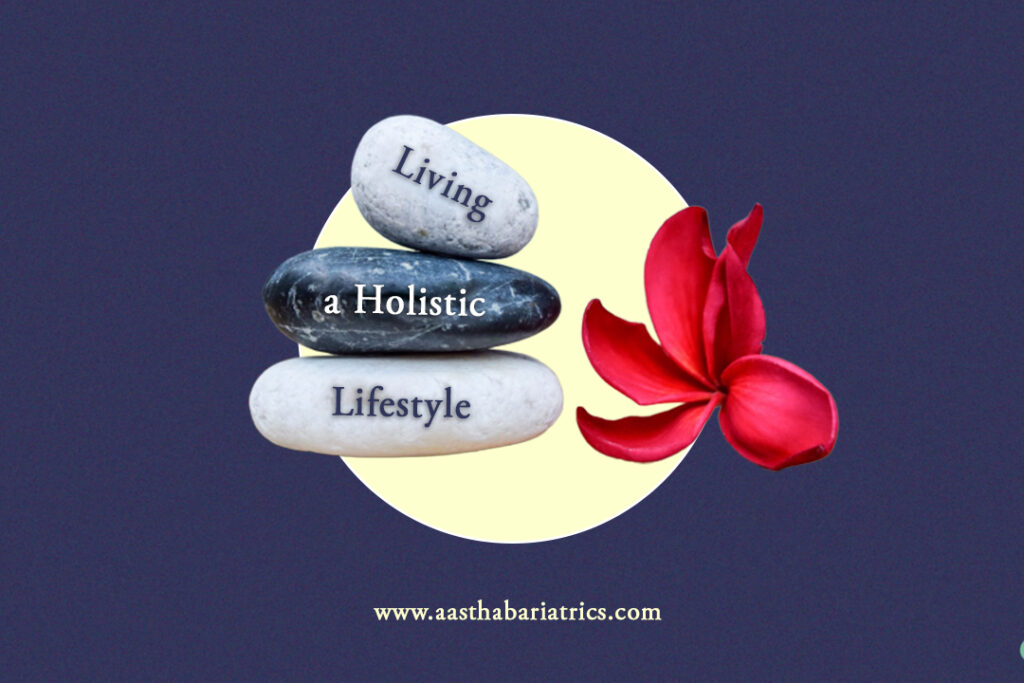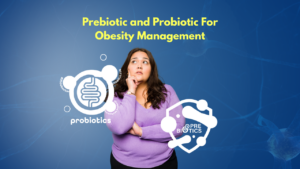
Yashvi Chheda
Bariatric Dietician & Content Writer

Living a Holistic Lifestyle - Aastha Bariatrics

Holistic is the way of living that is nourishing for your mind, body, as well as soul. Although this sounds a bit hippy-dippy, it works wonders for people who have practiced this for a long time and eventually made a habit of it. Holistic lifestyle is a way of living that makes you look at the bigger picture, that is, the whole person instead of focusing just on one thing.
A holistic way of life is one that emphasizes the connections between many facets of life and aims to advance general balance and well-being. It takes into account the interconnection and mutual effect of the physical, mental, emotional, spiritual, and social elements.
This is important, why? Because, you surely are taking care of your outer appearance, your food habits, your bicep, trips, 6 packs. Ooohh-nice.
But what about your soul? What about your mental peace? What about the contentment?
Are you able to achieve these things altogether just by exercise and eating food?
Also, it is very deep. It does not stop at that. It also makes sure how you are eating, do you have any distractions while you are eating, and much more.
Stress can be brought on by uncertainty and anxiety, which requires attention. But it’s not something you should put off until tomorrow. You’ll soon realise you have more control than you thought if you start taking the necessary actions today.
The very important principles of holistic living are as follows:
A holistic lifestyle is based on mindfulness, which is the practice of being in the moment and conscious of one’s thoughts, feelings, and actions. Making aware decisions and gaining a deeper comprehension of oneself and their surroundings can both be facilitated by practicing mindfulness.
Balance: A holistic way of living requires constant effort to achieve balance in all spheres of existence. This entails striking a balance between work and play, caring for one’s bodily and emotional well-being, upholding social ties, and fostering personal development.
Healthy Eating: A key component of a holistic lifestyle is paying close attention to the caliber of the food ingested and how it affects general health. It’s standard practise to prioritize eating whole, unprocessed foods and to practice mindful eating.
Whenever feasible, consume food in its natural state. Consuming mostly whole, organic foods including fruits, vegetables, whole grains, nuts, seeds, and legumes is what this entails.
Consume a range of foods. This increases the likelihood that you will consume all the vitamins, minerals, and phytonutrients that you require for optimum health.
Wherever possible, pay attention to lowering or eliminating chemical additions. Preservatives, synthetic colours and flavours, and artificial sweeteners all fall under this category. The easiest way to do this is to consume mostly home-cooked food and shop from reputable brands.
Avoid overly processed foods, refined grains, items that have been deep-fried, and added sugars. Food is more than just the nutrients it contains. In fact, the nutritional profile of a food is greatly influenced by how it is cultivated, processed, and prepared.
Physical activity: Staying physically healthy and well-being require regular exercise and physical activity. Positive effects on mental and emotional health can also be shown when engaging in enjoyable activities.
Including aerobic exercise in your routine has many advantages. Whether you refer to exercise as aerobic, cardiovascular, or endurance, you’re likely referring to the same thing: increasing your heart rate and blood flow of oxygenated blood to enhance your cardiorespiratory fitness. However, it has advantages beyond simply your heart. Exercise can help you control your weight, blood pressure, LDL (bad) cholesterol, blood sugar, stress levels, sleep quality, and memory.
Emotional Well-Being: Leading a holistic lifestyle requires being able to recognise and express emotions in a healthy way. This could entail techniques like writing, meditation, or asking friends, family, or therapists for assistance.
Spiritual exploration: For some people, a holistic lifestyle includes a strong spiritual component. To cultivate the spiritual side of life, this may entail practises like prayer, meditation, yoga, or connecting with nature.
Connection to Nature: It is thought that spending time in nature has many positive effects on one’s physical, mental, and emotional health. A holistic way of living promotes participating in outdoor activities and appreciating the beauty of nature.
Sustainable Living: Adopting eco-friendly practices and being aware of how one’s actions affect the environment are consistent with a holistic lifestyle that respects the interdependence of all living things.
Social Support: A holistic lifestyle requires creating and sustaining supportive social networks as well as meaningful connections. Social relationships support emotional health and can give a sense of purpose and belonging.
Lifelong Learning: A key component of living a holistic lifestyle is accepting opportunities for personal development and learning. Living a meaningful and enriched life can result from engaging in activities that challenge the intellect and increase knowledge.
Hydration: Dehydration symptoms can be brought on by stress. You can consume water through different drinks or foods like fruits and vegetables that are high in water content. According to some estimations, our food accounts for around 22% of the water we consume. Your body has different needs for water. For the majority of healthy persons, the recommended volume of fluids to prevent dehydration is:
13 glass for men
9 glass for women
Avoid drinking or drink in moderation: Alcohol is undoubtedly both a tonic and a poison. The main difference is in the dose. In most nations, excessive drinking contributes significantly to deaths that could be avoided. Alcohol is a factor in roughly half of all fatal automobile accidents. Drinking excessively increases the risk of developing breast and other cancers, harms an unborn child, damages the liver and heart, contributes to depression and violence, and ruins relationships.
Get enough sleep: Sleep is a necessary process that allows your body and mind to recover so that you can wake up feeling rejuvenated and aware. Healthy sleep is also important for keeping the body disease-free and healthy. The brain cannot function effectively without enough sleep. Your capacity to focus, think clearly, and process memories may be hampered by this. Before retiring to bed, do you enjoy viewing reruns of your favorite TV programme? Be careful; it doesn’t interfere with the seven to nine hours of sleep that people should get each night. TVs, laptops, tablets, phones, and other electronic devices with screens should be avoided in bedrooms.
Make the decision to live your life with yourself as a priority. Have a relationship with you! Pay attention to your body’s signals and give it the respect it deserves. You must alter your way of thinking in order to comprehend self-care. We believe we actually adore ourselves. But really, do we? When you value yourself, you won’t abuse your body by stuffing it with fast food or skipping a night’s sleep to finish a pressing task.
Many will even contend that making such sacrifices is unavoidable in today’s fast-paced world. However, when you live a disciplined life, you don’t have to subject yourself to concessions and sacrifices. In a balanced life, you are aware of your priorities and how to manage your time. You learn to balance everything when you live holistically.






